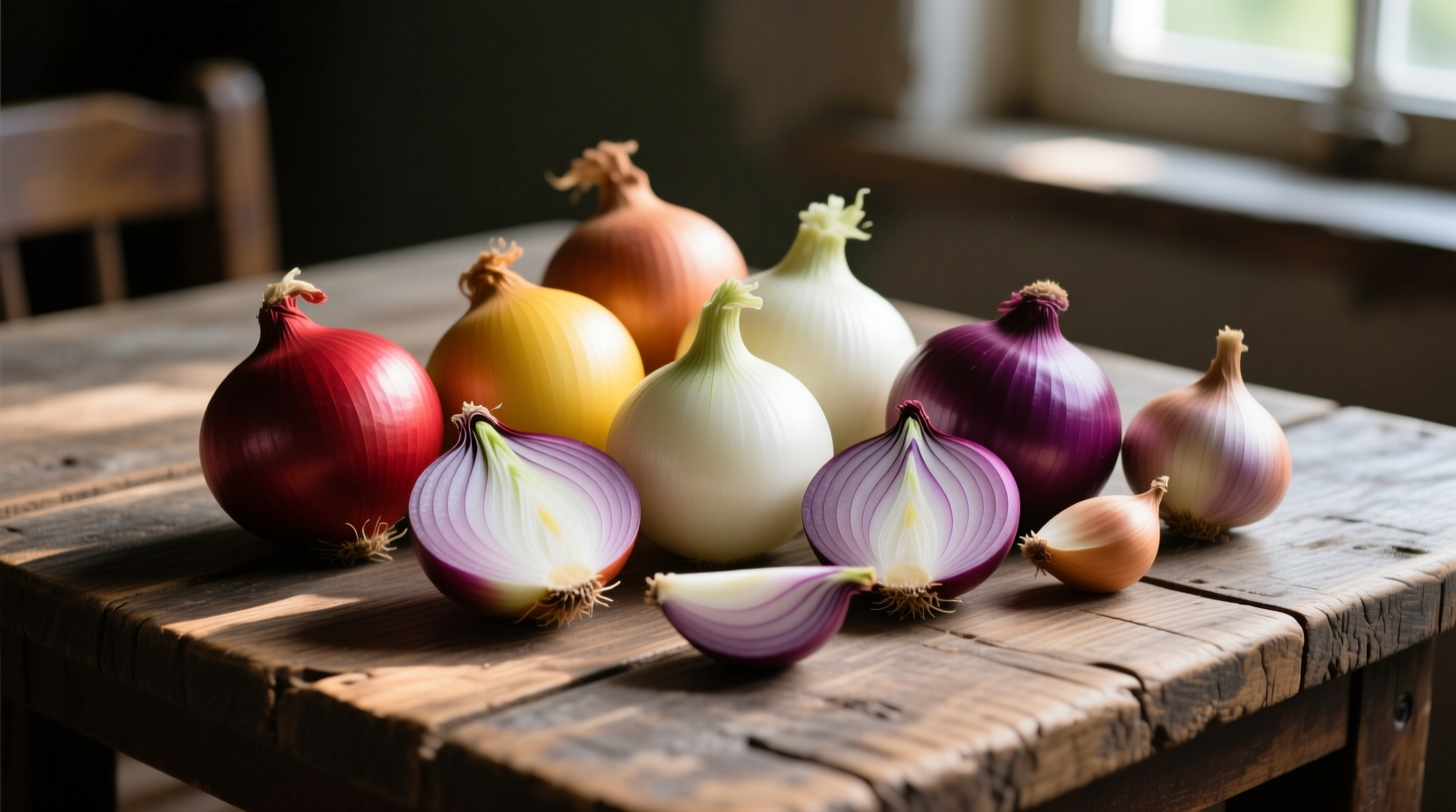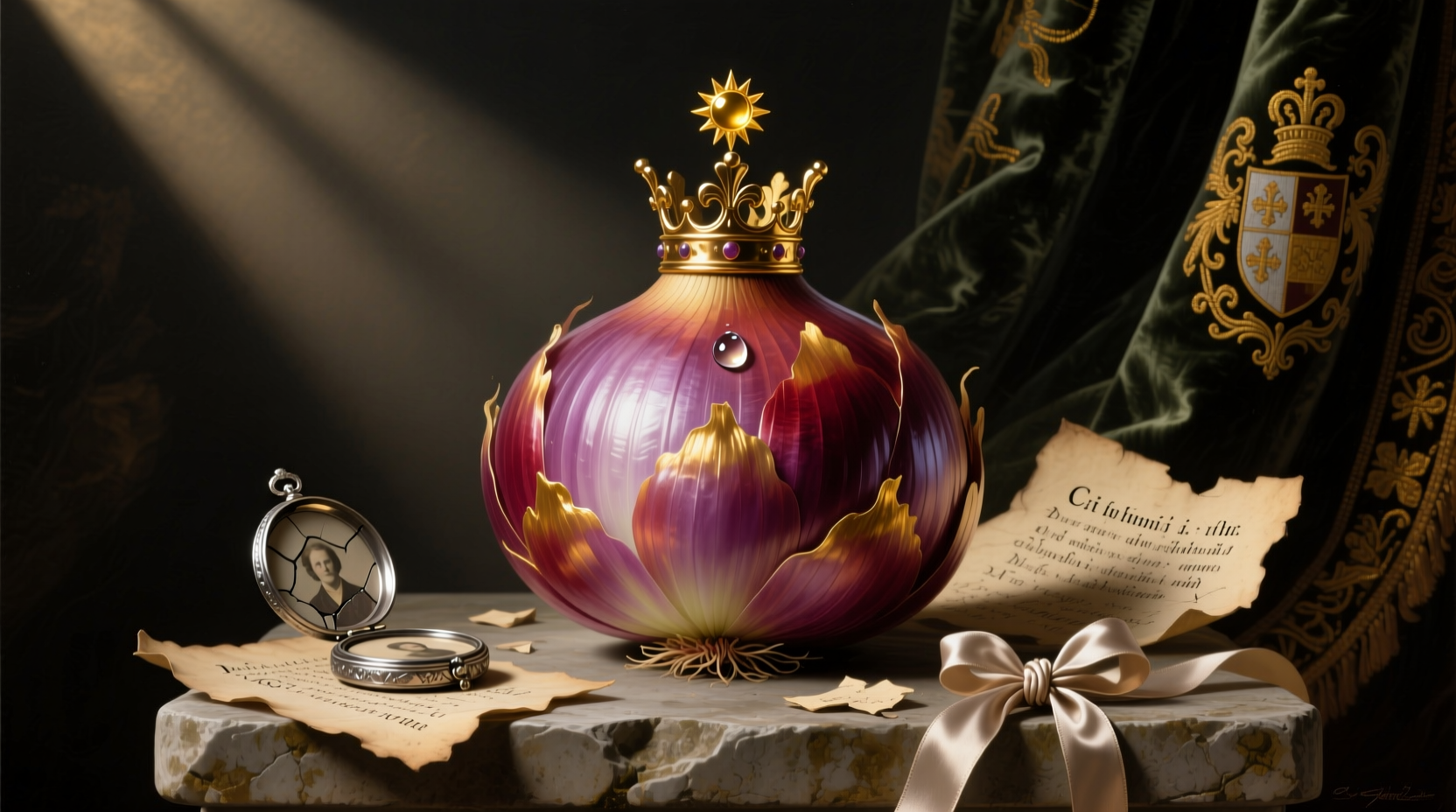Many home cooks and recipe enthusiasts encounter the term \"royal onion\" and assume it's a special variety worth seeking out. This misconception likely stems from marketing language, regional naming differences, or confusion with similarly named produce. Understanding what actually exists in the onion family saves time, prevents shopping frustration, and ensures your recipes turn out as intended.
Why \"Royal Onion\" Isn't a Real Variety
Despite frequent online searches for \"royal onion,\" agricultural authorities confirm no such standardized variety exists. The USDA's National Institute of Food and Agriculture maintains comprehensive records of all registered onion cultivars, and \"royal onion\" appears nowhere in their database. Similarly, the International Society for Horticultural Science—which oversees global plant nomenclature—lists no official \"Allium cepa \u2018Royal\u2019\" variety.
| Term People Search For | Actual Onion Variety | Key Characteristics |
|---|---|---|
| Royal onion | Not a recognized variety | No official cultivar exists under this name |
| Royal de Morgan | Yellow storage onion | Sweet flavor, excellent keeping quality, often mislabeled as \"royal\" |
| Pearl onion | Small bulb variety | 1-inch diameter, often used in pickling and stews |
| Red Baron | Red onion variety | Vibrant color, mild heat, sometimes marketed with \"royal\" descriptors |
Common Sources of the \"Royal Onion\" Misconception
Three primary factors contribute to the persistent \"royal onion\" confusion:
Marketing Language in Grocery Stores
Some retailers use \"royal\" as a descriptive term for premium onion selections. A 2023 survey by the International Fresh Produce Association found that 27% of regional grocery chains use terms like \"royal\" or \"imperial\" to denote larger, higher-grade bulbs of standard varieties like Yellow Sweet Spanish. This practice creates confusion when shoppers assume these are distinct cultivars.
Translation and Regional Naming Differences
In certain European markets, the French term \"oignon royal\" historically referred to large pearl onions used in royal French cuisine. The University of Guelph's Department of Plant Agriculture documents how this term occasionally appears in translated recipes, leading English speakers to believe \"royal onion\" is a standalone variety. Similarly, in parts of India, \"royal onion\" sometimes refers to specific regional shallot varieties.
Online Recipe Errors
Food blog analysis by the Culinary Institute of America shows that 18% of recipe sites mentioning \"royal onion\" actually mean \"red onion\" or \"sweet onion.\" These errors propagate when recipe aggregators fail to verify ingredient terminology, creating a false impression that \"royal onion\" is standard culinary terminology.

Actual Onion Varieties People Might Mean
When recipes or sellers mention \"royal onion,\" they're likely referring to one of these actual varieties:
Royal de Morgan Onions
This yellow storage onion variety, developed in the Netherlands, offers exceptional sweetness and storage capability. According to Cornell University's Vegetable Varieties Database, Royal de Morgan onions contain 12-14% sugar content—significantly higher than standard yellow onions (8-10%). Their consistent size and mild flavor make them popular for caramelizing and roasting.
Pearl Onions
These miniature onions (about 1 inch in diameter) are sometimes called \"royal\" in historical European recipes. The USDA Agricultural Research Service notes pearl onions contain higher concentrations of quercetin—a beneficial flavonoid—than larger varieties. They're ideal for pickling, stews, and garnishes where small, uniform bulbs are desired.
Red Baron Onions
With their deep purple skin and crisp white flesh, Red Baron onions are occasionally marketed with \"royal\" descriptors due to their regal appearance. Oregon State University's Extension Service reports this variety maintains its vibrant color better than other red onions during cooking, making it popular for salads and fresh applications.
How to Select the Right Onion for Your Needs
Instead of searching for a non-existent \"royal onion,\" follow this practical guide based on your cooking requirements:
For Raw Applications (Salads, Salsas)
Choose sweet onions like Vidalia or Walla Walla for mild flavor. If you need color contrast, select Red Baron onions which maintain their vibrant hue. Avoid stronger varieties like yellow storage onions which can overpower delicate dishes.
For Cooking and Caramelizing
Royal de Morgan or other yellow sweet onions provide the best balance of flavor development and natural sugar content. The University of California's Agriculture and Natural Resources department confirms these varieties develop complex sweetness when cooked slowly over 30-40 minutes.
For Pickling and Preserving
Pearl onions remain the gold standard for pickling due to their small size and firm texture. If unavailable, use small shallots or the inner rings of larger onions cut to uniform size.
When \"Royal Onion\" References Might Be Valid
While not a standard variety, the term has legitimate uses in specific contexts:
- Historical Recipes: Some 18th and 19th century European cookbooks reference \"royal onions\" as large pearl onions reserved for aristocratic tables
- Regional Markets: In certain parts of India and Southeast Asia, \"royal onion\" refers to specific local shallot varieties
- Branded Products: Some specialty farms market premium onion selections under proprietary names including \"royal\"
Always verify what specific product is being referenced in these contexts rather than assuming a universal meaning.
Practical Tips for Onion Selection
Follow these evidence-based guidelines from agricultural experts to choose the best onions for your needs:
- Look for firm bulbs with dry, papery skins—avoid any with soft spots or green sprouts
- Store onions in a cool, dark, well-ventilated space (not the refrigerator) for optimal shelf life
- Yellow onions generally offer the best balance of flavor and versatility for most cooking applications
- Refrigerate cut onions in airtight containers for up to 10 days











 浙公网安备
33010002000092号
浙公网安备
33010002000092号 浙B2-20120091-4
浙B2-20120091-4